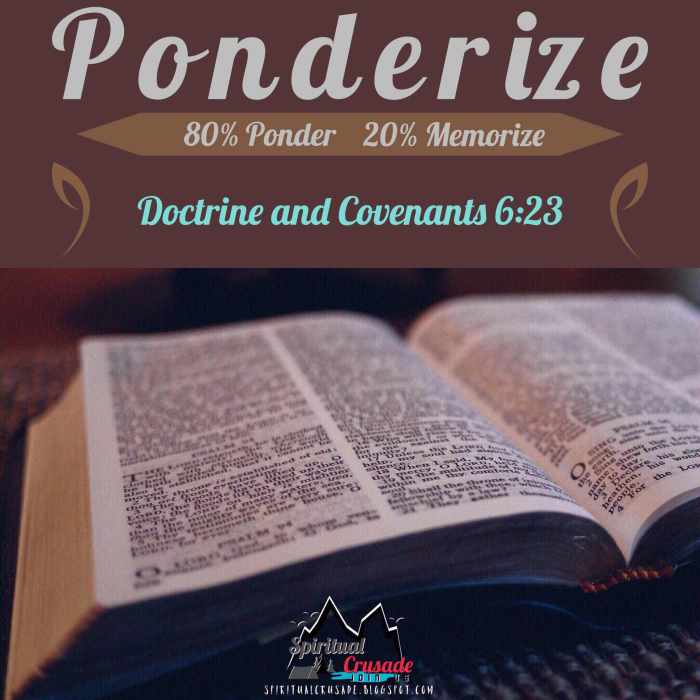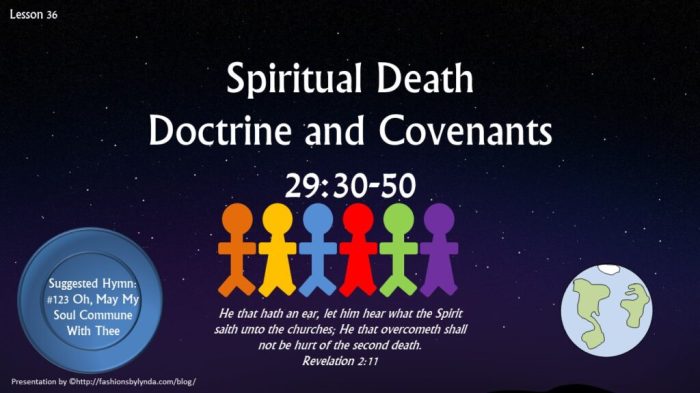Doctrine and covenants 6 36 – Embark on a captivating journey through Doctrine and Covenants 6:36, where the profound significance of divine authority and the sacred nature of the priesthood are illuminated.
This comprehensive discourse explores the principles that govern priesthood authority, the responsibilities of priesthood holders, and the transformative power it bestows. Delve into the intricate connection between priesthood and personal righteousness, and discover the profound blessings and ordinances that can be accessed through its sacred authority.
Divine Authority and the Priesthood

Doctrine and Covenants 6:36 emphasizes the crucial role of divine authority in establishing and maintaining God’s order on earth. This authority originates from God and is delegated to worthy individuals through the priesthood.
Significance of Divine Authority
Divine authority is essential because it authenticates the teachings and actions of God’s servants. Without it, individuals would be left to rely solely on their own interpretations, which could lead to error and confusion. Divine authority provides a firm foundation for faith and ensures that God’s will is being carried out on earth.
Role of the Priesthood, Doctrine and covenants 6 36
The priesthood is the channel through which divine authority is bestowed upon individuals. Priesthood holders are authorized to act in God’s name and perform sacred ordinances, such as baptism and administering the sacrament. They also have the responsibility to teach the gospel, bless others, and lead the Church.
By holding the priesthood, individuals are empowered to access the power of God and use it for righteous purposes. They become instruments in His hands, helping to bring about His work on earth.
Principles of Priesthood Government: Doctrine And Covenants 6 36
Priesthood authority is governed by specific principles Artikeld in Doctrine and Covenants 6:36. These principles ensure the proper use and exercise of priesthood power.
One fundamental principle is the concept of “proper authority,” which means that priesthood holders must act within the scope of their assigned keys and responsibilities. Another principle is “unrighteous dominion,” which prohibits priesthood holders from using their authority for personal gain or to control others.
Accountability
Priesthood holders are accountable to God for their actions. They must exercise their authority with integrity and humility, recognizing that they are stewards of sacred power.
Unity and Counsel
Priesthood leaders are expected to work together in unity and counsel. They should seek consensus and avoid making decisions based on individual preferences or biases.
Revelation and Inspiration
Priesthood holders are entitled to revelation and inspiration as they seek to fulfill their responsibilities. They should prayerfully seek guidance and be open to the promptings of the Holy Ghost.
The Role of Priesthood Holders
Priesthood holders bear the responsibility of administering the ordinances of the gospel, magnifying their callings, and living worthy of the blessings of the priesthood. They are to act as representatives of Jesus Christ, serving others with love and compassion.
Responsibilities and Duties
- Administer the ordinances of the gospel, such as baptism, confirmation, and the sacrament.
- Magnify their callings by diligently fulfilling their responsibilities.
- Live worthy of the blessings of the priesthood by following the teachings of Jesus Christ.
- Act as representatives of Jesus Christ by serving others with love and compassion.
The Power of the Priesthood

The priesthood is a divine authority granted to worthy male members of The Church of Jesus Christ of Latter-day Saints. It is a sacred trust that empowers individuals to act in the name of God and to bless the lives of others.
The power of the priesthood extends far beyond the performance of ordinances; it encompasses the ability to lead, guide, and inspire.
Through the priesthood, individuals can access the power of God to perform miracles, heal the sick, and even raise the dead. They can also use this power to bless their families, friends, and communities. The priesthood is a tool for good, and those who hold it have a responsibility to use it wisely and righteously.
Examples of How the Priesthood Can Be Used to Bless and Uplift Others
There are countless ways that the priesthood can be used to bless and uplift others. Here are just a few examples:
- Priesthood holders can administer the sacrament, which is a sacred ordinance that helps us remember the Savior’s sacrifice and renew our covenants with God.
- Priesthood holders can perform baptisms and confirmations, which are essential ordinances for salvation.
- Priesthood holders can give blessings, which are powerful prayers that can provide comfort, guidance, and healing.
- Priesthood holders can serve as leaders in the Church, providing guidance and support to members.
- Priesthood holders can use their priesthood to protect and defend their families and communities.
The priesthood is a powerful tool for good, and those who hold it have a sacred responsibility to use it wisely and righteously. By doing so, they can bless the lives of others and help to build the kingdom of God on earth.
Priesthood Ordinances and Blessings

The priesthood is the power and authority of God delegated to worthy male members of The Church of Jesus Christ of Latter-day Saints. Through the priesthood, certain ordinances and blessings can be performed, as Artikeld in Doctrine and Covenants 6:36. These ordinances and blessings are essential for our spiritual progression and eternal salvation.
Baptism
Baptism is the first saving ordinance of the gospel. It is performed by immersion in water by one holding the proper priesthood authority. Baptism represents the death, burial, and resurrection of Jesus Christ and symbolizes our repentance from sin and our willingness to follow Him.
Doctrine and Covenants 6:36 emphasizes the importance of seeking knowledge, and this principle extends to all areas of our lives. Just as we strive to understand the teachings of the scriptures, so too can we benefit from exploring other sources of knowledge, such as the abeka world history test 10 . By expanding our horizons, we gain a deeper understanding of the world around us and enrich our spiritual journey as we seek to follow the path laid out in Doctrine and Covenants 6:36.
Through baptism, we become members of The Church of Jesus Christ of Latter-day Saints and receive the gift of the Holy Ghost.
Confirmation
Confirmation is the ordinance that follows baptism. It is performed by the laying on of hands by one holding the Melchizedek Priesthood. Through confirmation, we receive the gift of the Holy Ghost, which is a constant companion to guide and comfort us.
The Holy Ghost testifies of truth, helps us understand the scriptures, and prompts us to do good.
Sacrament
The sacrament is a weekly ordinance that commemorates the Savior’s Atonement. It consists of partaking of bread and water, which represent the body and blood of Jesus Christ. As we partake of the sacrament, we renew our baptismal covenants and invite the Spirit to be with us.
Priesthood Ordinances
Priesthood ordinances are reserved for worthy male members of the Church who hold the priesthood. These ordinances include:
- Ordination to the Priesthood:This ordinance confers the priesthood upon worthy male members who have been called to serve in various priesthood offices.
- Temple Ordinances:Temple ordinances, such as marriage sealing and eternal covenants, are performed in holy temples and are essential for our eternal progression.
Priesthood Blessings
Priesthood blessings are pronounced by those who hold the priesthood. These blessings can be given for a variety of purposes, such as:
- Healing Blessings:These blessings are given to those who are sick or injured, and they can provide comfort, healing, and peace.
- Patriarchal Blessings:These blessings are given by patriarchs to worthy members of the Church and provide personal guidance and direction.
- Other Blessings:Priesthood blessings can also be given for protection, guidance, comfort, and other purposes.
The priesthood ordinances and blessings are essential for our spiritual progression and eternal salvation. Through these ordinances, we make covenants with God and receive the blessings of His power and authority. As we worthily participate in these ordinances and blessings, we draw closer to God and become more like Him.
Priesthood and Personal Righteousness

The priesthood is not merely a title or position; it is a sacred trust that requires personal righteousness. Priesthood holders are called to represent God and to act in His name, and their actions should reflect the holiness of the authority they hold.
Living worthy to hold and exercise the priesthood means living in accordance with the principles of the gospel, including chastity, honesty, integrity, and obedience. It also means being worthy to receive the Holy Ghost, which is the constant companion of those who are worthy to hold the priesthood.
The Importance of Personal Righteousness
Personal righteousness is essential for priesthood holders for several reasons:
- It enables them to magnify their callings and to effectively serve others.
- It protects them from the temptations of the adversary.
- It sets an example for others and helps to strengthen the faith of those around them.
When priesthood holders live righteously, they not only bless their own lives but also the lives of those they serve. They become instruments in God’s hands to bring about His purposes and to build up His kingdom.
FAQ Guide
What is the significance of divine authority in Doctrine and Covenants 6:36?
Doctrine and Covenants 6:36 establishes the divine origin of priesthood authority, emphasizing its role in establishing and maintaining God’s order on earth.
How does the priesthood contribute to the establishment of God’s order?
The priesthood provides the necessary authority to perform ordinances, administer blessings, and lead the Church, thereby facilitating the implementation of God’s plan.
What are the key principles that govern priesthood authority?
Doctrine and Covenants 6:36 highlights principles such as proper ordination, acting in accordance with God’s will, and magnifying one’s calling.
How can priesthood holders effectively fulfill their responsibilities?
Priesthood holders should strive to live righteously, study the scriptures, and seek guidance from the Holy Ghost.